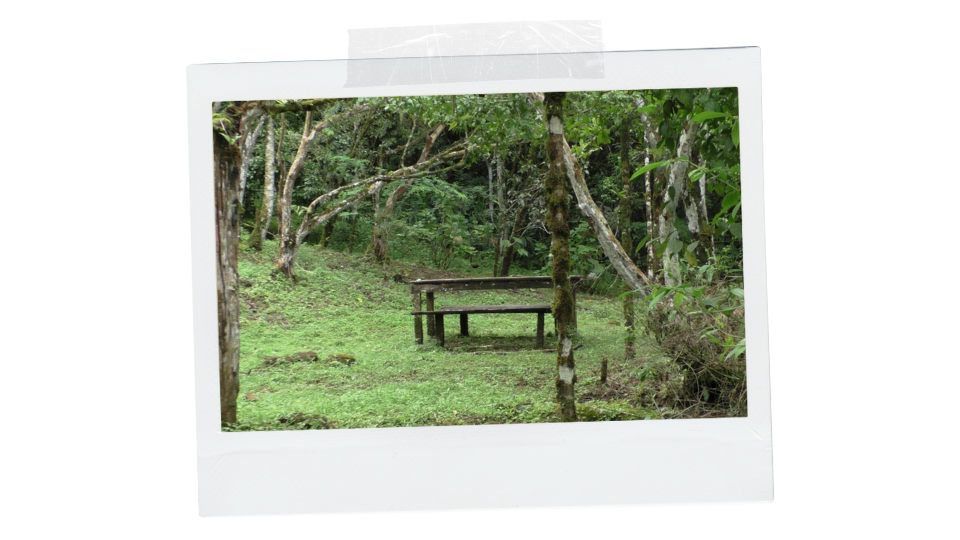The Magic of AMACOBAS

One of our most recent workshops in the program was about sustainable agriculture. During this workshop, we got to visit AMACOBAS, which is a non-profit organization which is focused on the conservation of the Alexander Skutch biological corridor, as well as the empowerment of women. Indeed, the AMACOBAS organization is made up entirely of women from seven different rural towns in the corridor. When we first arrived at the organization, they explained to us the mission and the formation of their organization: to protect and maintain the wildlife of the corridor, and in so doing create new livelihoods for women who were previously completely bound to their households.
AMACOBAS is the result of pure community organizing. There was no outside force which formed their organization, there was no governmental mission. It was by the idea of a group of women that their organization was formed. In another discussion our group had about volunteering, we discussed the phenomenon of ‘volunteerism,’ or the pervasive thought that the intervention of an outside group was necessary for the substantial change of a community. However, this is often the opposite of the truth. While millions of dollars are poured into foreign aid every year, only a minority of that money actually reaches the lives of the people it is claiming to help. We talked about how change enacted by an outside force is often experienced as violence. AMACOBAS is the opposite of that idea.
It was enacted by a group of women who could no longer tolerate the degradation of the place they lived in by non-sustainable agriculture. It was also a group of women existing within a culture which was and in some ways still is intensely patriarchal. The beginning of the group was marked by difficulty: because the women were in charge of households, they had to finish all their work early in the day and then walk for miles to get to the meeting place. Some were banned from going by their husbands or male relatives. The women realized that they needed something that women could work on from home, and so the organization began to establish projects with every woman in her home, such as gardens and small businesses. Eventually, they put together their first farmer’s market, and since then, they have continued to make rural women sustainably financially independent.

They continue their work today. While COVID interrupted their farmer’s markets, they are planning another one soon, and they work with local farms to divest them from chemical pesticides which poison the waters of the corridor. During our trip, they showed us around their processing facility, where they make flour out of yuca to sell to tourists. They also show us the forests and the fields around the newly-constructed facility, where several petroglyphs surround the property. The women who work there give the sense of a carefully constructed team, and they each have their own dream which AMACOBAS has helped them achieve. One runs a cafe out of her home, another is divesting her family farm from chemicals. There is a sense of hard work, of commitment, and of the unapologetic drive which helps these women achieve so much.
Our workshop was about sustainable agroecology, and how we can get rid of mono-cultures and chemical pesticides to make the way we produce food much more sustainable. But everything is connected–what brings you into one topic often leads you out of another. When women can produce a lot of their own food at home, or even start up new businesses at home, it makes them that much more independent. The connection between sustainability and undoing other kinds of oppression is very real, and AMACOBAS manifests it, creating a better world for rural women in their area, who then go on to make their communities a better place because of their support.
La Magia de AMACOBAS
 Uno de nuestros talleres más recientes del programa fue sobre agricultura sostenible. Durante este taller pudimos visitar AMACOBAS, que es una organización sin fines de lucro que se enfoca en la conservación del corredor biológico Alexander Skutch, así como el empoderamiento de las mujeres. De hecho, la organización AMACOBAS está compuesta íntegramente por mujeres de siete localidades rurales diferentes. Cuando llegamos por primera vez a la organización, nos explicaron la misión y la formación de su organización: proteger y mantener la vida silvestre del corredor y, al hacerlo, crear nuevos medios de vida para las mujeres que antes estaban completamente ligadas a sus hogares.
Uno de nuestros talleres más recientes del programa fue sobre agricultura sostenible. Durante este taller pudimos visitar AMACOBAS, que es una organización sin fines de lucro que se enfoca en la conservación del corredor biológico Alexander Skutch, así como el empoderamiento de las mujeres. De hecho, la organización AMACOBAS está compuesta íntegramente por mujeres de siete localidades rurales diferentes. Cuando llegamos por primera vez a la organización, nos explicaron la misión y la formación de su organización: proteger y mantener la vida silvestre del corredor y, al hacerlo, crear nuevos medios de vida para las mujeres que antes estaban completamente ligadas a sus hogares.
AMACOBAS es el resultado de la pura organización comunitaria. No había ninguna entidad externa que formara su organización, no había ninguna misión gubernamental. A partir de la idea de un grupo de mujeres, se formó su organización. En otra discusión que nuestro grupo tuvo sobre el voluntariado, discutimos el fenómeno “volunteerism”, o el pensamiento generalizado de que la intervención de un grupo externo es necesario para el cambio sustancial de una comunidad. Sin embargo, esto suele ser lo contrario de la verdad. Si bien cada año se invierten millones de dólares en ayuda exterior, sólo una minoría de ese dinero llega realmente a las vidas de las personas a las que dice ayudar. Hablamos de cómo el cambio impulsado por una fuerza externa a menudo se vive como violencia. AMACOBAS es todo lo contrario a esa idea.
Fue promulgado por un grupo de mujeres que ya no podían tolerar la degradación del lugar en el que vivían por la agricultura no sostenible. También era un grupo de mujeres que existían dentro de una cultura que era y en cierto modo sigue siendo intensamente patriarcal. El comienzo del grupo estuvo marcado por dificultades: como las mujeres estaban a cargo de las casas, tenían que terminar todo su trabajo temprano en el día y luego caminar kilómetros para llegar al lugar de reunión. A algunas se les prohibió ir por sus maridos o parientes hombres. Las mujeres se dieron cuenta de que necesitaban algo en lo que pudieran trabajar desde casa, por lo que la organización comenzó a establecer proyectos con cada mujer en su hogar, como jardines y pequeños negocios. Con el tiempo, crearon su primer mercado de agricultores y, desde entonces, han seguido haciendo que las mujeres rurales sean financieramente independientes de forma sostenible.
Continúan su trabajo hoy. Si bien el COVID interrumpió sus mercados, están planeando otro pronto y trabajan con las granjas locales para despojarlas de los pesticidas químicos que envenenan las aguas del corredor. Durante nuestro viaje, nos mostraron sus instalaciones de procesamiento, donde elaboran harina de yuca para venderla a los turistas. También nos muestran los bosques y campos alrededor de las instalaciones recién construidas, donde varios petroglifos rodean la propiedad. Las mujeres que trabajan allí dan la sensación de un equipo cuidadosamente construido, y cada una tiene su propio sueño que AMACOBAS les ha ayudado a realizar. Una dirige una cafetería en su casa, otra está despojando de productos químicos a su granja familiar. Hay una sensación de trabajo duro, de compromiso y de impulso sin complejos que ayuda a estas mujeres a lograr tanto.
Nuestro taller versó sobre agroecología sostenible y cómo podemos deshacernos de los monocultivos y los pesticidas químicos para hacer que la forma en que producimos alimentos sea mucho más sostenible. Pero todo está conectado: lo que te lleva a un tema a menudo te saca de otro. Cuando las mujeres pueden producir una gran cantidad de sus propios alimentos en casa, o incluso iniciar nuevos negocios en casa, se vuelven mucho más independientes. La conexión entre la sostenibilidad y deshacer otros tipos de opresión es muy real, y AMACOBAS la manifiesta, creando un mundo mejor para las mujeres rurales de su zona, quienes luego hacen de sus comunidades un lugar mejor gracias a su apoyo.
—Narges

